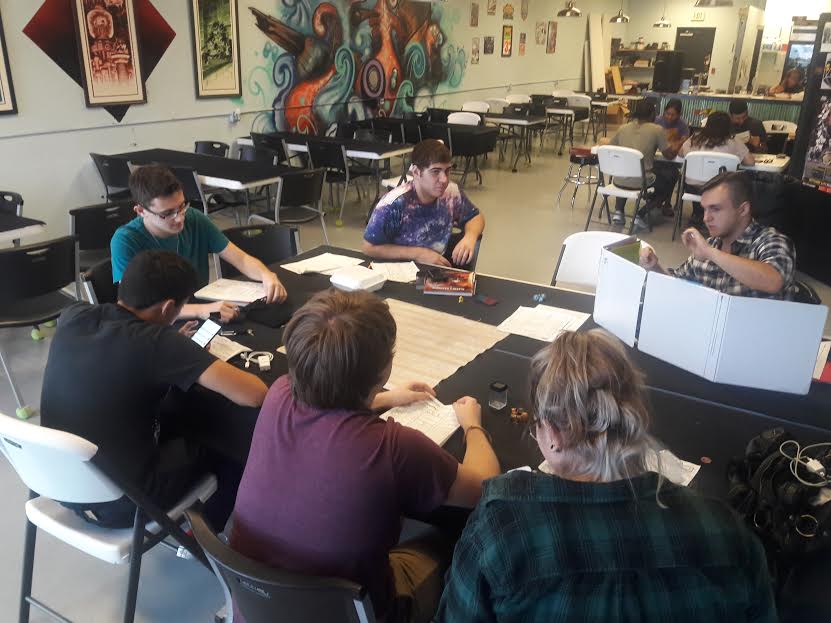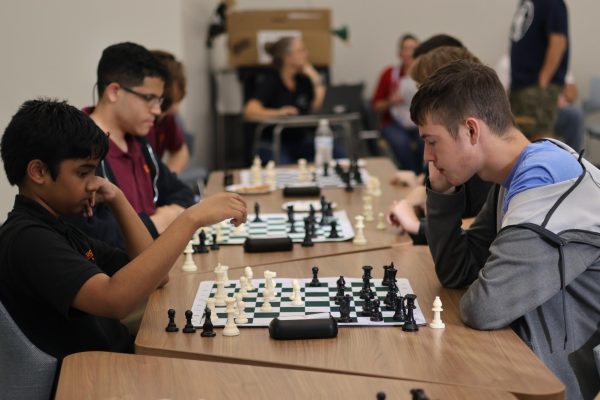Of dice and men
Dungeons and Dragons, the OG roleplaying game, lives on
photo by Peyton Whittington
Foerster explains the guild’s next adventure he has lined up in his campaign. Foerster always comes prepared to D&D sessions with two to five pages of campaign notes.
“Heart of the cards,” senior Cole Monica mutters as he shakes the 20-sided dice in between his palms. He throws. He watches. It lands…on a 7. His character is struck by the tip of an Orcish war lord’s poisonous spear.
Monica is a player in one of multiple Dungeons and Dragons guilds formed by students in the past year. Most meet at Campus Cards and Games on Alafaya Trail, which has big tables that are ideal for playing (and $2 coffee pots, too).
D&D, as it is commonly referred to, is the world’s first roleplaying game. Players create characters, roleplay as them in a fantasy setting invented by the Dungeon Master (DM) and form a story or campaign through their actions in the game.
“You can play video games or computer games all you want, but you’re always limited. There’s a finite amount of options,” senior John Foerster said. “You’re not limited to options in Dungeons and Dragons. That’s why it’s such a great game.”
Limitless possibilities can be achievable because every action in the game is based on die rolls. For example, if one wanted to climb a tree in game, a high 20-sided dice roll would merit a smooth, swift climb to the top. A low roll might result in the character getting a few cuts and scrapes from stray branches on the way up, or possible fall out of the tree halfway if a critical or ‘crit’ fail is rolled (rolling a one). This element of unpredictability is part of the appeal for most players.
“You get to be literally anyone you want, you get to do things that people don’t do and because a lot of it is based on chance, you just don’t know for sure what’s going to happen,” Monica said.
Before any of the adventuring happens, everyone must experience character creation. Inspiration can come from books, video games, anime, movies or anything else that sparks an idea for a character design. Players might be drawn to other aspects of the game as well, including the artistry behind it.
“My first thought was that when we create something, such as when someone writes an essay or paints or draws, it often reflects certain characteristics or ideas people have. If someone creates a world, and is a dungeon master of it, I might get to know the person better by seeing how they create things,” senior Samuel Naranjo said. “I would think that creating a campaign is a sort of art form.”
Naranjo uses himself as an example of a player that isn’t interested in the hobbies associated with most D&D players, yet still enjoys playing it.
“I’m not a gamer, I’m not into comic books, I’m not into anything like that. If anything, I would say I’m apart from that world,” Naranjo said. “But I do enjoy [D&D] immensely.”
Apart from the player’s perspective is the work a DM puts into creating a campaign. DMs such as senior Michael Clark define clear advantages and disadvantages to ‘DMing’ for a guild versus playing in it.
“You control everything in the world, but you don’t have that intimate character creation. You create many things instead of one solid character,” Clark said.
Though most DMs enjoy campaign creation, a lot of DMing involves more work than play.
“Your job as a DM is more like an accountant. You’re crunching numbers and flipping through notes a lot because the story could change at any point in time based on what your characters want to do,” Foerster said. “I know that I’ve gone through several cups of coffee to stay awake during games because it’s mentally draining, but it’s all worth it for the sake of the game and to see my friends happy.”
D&D involves a lot of math, concentration and critical thinking. Regardless, quality storytelling and creativity are the core reasons why people gather around dining room tables on Saturdays to roll dice and go on adventures.
“If you like creating, if you like artistic expression [or] if you like making up a world and interacting with it however you want to, then D&D is absolutely the game for you,” Naranjo said.
Your donation will support the student journalists of Hagerty High School. Your contribution helps us publish six issues of the BluePrint and cover our annual website hosting costs. Thank you so much!







